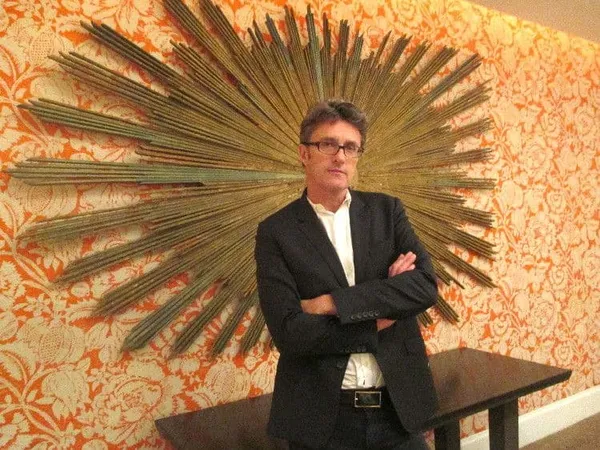 |
| Ida director Pawel Pawlikowski on Jean-Luc Godard: "Some of the freedom I took with the continuity, which is trying to shoot the film in tableaux…" Photo: Anne-Katrin Titze |
Maggie Gyllenhaal and Peter Sarsgaard hosted a reception and screening at the Crosby Street Hotel in New York of Pawel Pawlikowski's Ida, which stars Agata Trzebuchowska, Agata Kulesza and Dawid Ogrodnik. As Jake Gyllenhaal scrambled off, I spoke with Pawel about the freedom Jean-Luc Godard's Vivre Sa Vie, starring Anna Karina, gave him; Krzysztof Kieslowski's Decalogue; Odysseus; Milos Forman's Loves Of A Blonde and Fireman's Ball; fairytales with Jean-Pierre Dardenne; Luc Dardenne and Yoko Ono; Paul Celan's Fugue Of Death, until we ended with the tale of Winnie the Pooh.
Ida is the funereal journey of two women, told in stark black and white tableaux, set in 1960s Poland. Anna, brought up in a convent and about to take her vows to become a nun is sent out to visit her only relative, aunt Wanda, who used to be a judge and knows of the family secrets. Together, they embark on a trip into the soul of Poland and their own hearts of darkness.
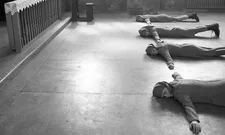 |
| The convent: "It's a simpler world that's a bit emptier." |
Anne-Katrin Titze: You have a neon sign that says Odys at one point. I was wondering who is closest to Odysseus. Is it Ida? Is it Wanda? Is it you?
Pawel Pawlikowski: It was one of the ideas that crept up and I liked it most. We inherited some neons from the Sixties or found them and that was the one I thought was vaguely resonant but it wasn't terribly meaningful.
AKT: It's a nice reference.
PP: When you have a film where there's not much in a shot, everything becomes really meaningful.
AKT: There is a lot going on at the bottom of the screen in your movie. I loved how you handled the subtitles, having them sometimes in the top half. Did you make that decision?
PP: Yes, because it was a disaster. When I was framing like I was framing, at some point I realised that a subtitle problem arises. But it was too late to change the framing. So in post-production, I thought lets move them wherever.
AKT: It's a very elegant solution.
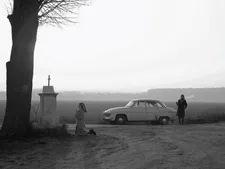 |
| Ida and Wanda at a crossroads: "Full of irony." |
PP: Audiences burst out laughing occasionally. At some festivals, people thought it was a joke. Humorous relief.
AKT: They become part of your film. A large percentage of the International audience doesn't speak Polish and obviously needs the subtitles.
PP: When I was shooting it, I didn't think it would have such a wide distribution. Or I wasn't thinking about that at all. That came later. The awful thing is, I just saw some clips from the film on the DVD and they are not doing that. On the DVD they put the subtitles at the bottom electronically. And it destroys the picture completely. It's right across people's faces.
AKT: Can't you change that?
PP: It's been released in so many countries. I can't control what happens to the translations. I wasn't in control of the German translation. It was terrible. The English translation was straight forward because I was completely involved. Then the French was very respectful and I speak French so I can check if it was right and make some suggestions. Whereas the German was translated from the English subtitles, so a second removed. And I didn't bother to check, although I speak German. And people told me so much was lost. You know, ambiguity, subtlety.
AKT: You start with total silence. It's as though it adds to the black and white. You are giving us for a few seconds the question - is it silent, too?
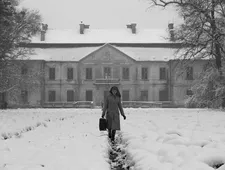 |
| Anna transforming into Ida: "In a way it's more intuitive, these aren't such intellectual choices." |
PP: Yeah, on a street, far away from life, snow. I wanted the film to be silent. When the details of sound come in, they would be quite striking. They would resonate. When the music comes in, it really comes in as a big thing, an event.
AKT: And then the first scene is your protagonist [Agata Trzebuchowska as Anna] fixing the nose of her future bridegroom [a statue of Jesus]. Is the entire film a preparation, her journey to eventually end up ready to commit to her vows?
PP: I don't think in those terms but it's nice to hear it. In a way it's more intuitive, these aren't such intellectual choices. All you can do is say - this is right, this is wrong, this is better. You don't actually think this would mean that, like transliterating some theory.
AKT: As far as identity is concerned, you present the audience with a Jewish nun and a judge with very bad judgement about her own behavior. I was thinking of Krzysztof Kieslowski's Decalogue at times.
PP: I love three of them. I've kind of forgotten the rest. I love the one about love.
AKT: The mood in the bar scenes reminded me more of Milos Foreman's early work, Loves of A Blonde or Fireman's Ball.
PP: I love Milos Foreman's Czech films. But it has more to do with my memory of that time as a kid, you know. Poland from the 60s, I didn't process it from other films, it's more some fragments of reality that I remember. When you are a kid you absorb things very directly without interpreting them. So they really stay in your memory. These sort of provincial hotels and restaurants and bands that are playing Italian hits. That's what I love.
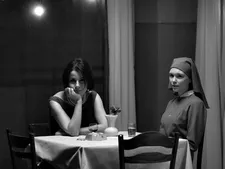 |
| Wanda and Ida rural entertainment: "It's a nostalgia trip in a way." |
AKT: Portofino is the only word in the lyrics I understood.
PP: It's a nostalgia trip in a way. It's a simpler world that's a bit emptier. There's less information, less noise, less movement. It has something to do with family album photographs. But it's not a literal reconstructing, because I love that, you know, some world that I have lost or something from childhood. I left Poland when I was 14 without realizing that I'll never get back.
So for me that childhood thing was really powerful. It wasn't a film about other films, but I love the Czech New Wave. I also love Godard. Some of the freedom I took with the continuity, which is trying to shoot the film in tableaux, rather than how a normal story continues; looking back, it has something to do with Godard's film Vivre Sa Vie, which is a great film told in tableaux. Black and white as well.
AKT: One beautiful tableau I can think of is the arrival at the cross on the country road. One woman is praying, the other one smoking. And at an other point the dialogue 'I won't let you waste your life,' says the drunk to the nun.
PP: Full of irony.
AKT: And also a mirroring of different paths in life. You are constantly pointing at choices.
PP: I wanted to make it thick and ambiguous rather than clear cut. I wanted to muddy the waters, you know, and make everything full of irony and ambiguity.
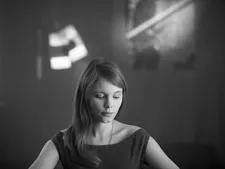 |
| Agata Trzebuchowska as Ida: Your golden hair, Margarete… |
AKT: The costumes help with that. The peignoir, the flimsy dressing gown Wanda [Agata Kulesza] is wearing, for example.
PP: People thought she was a prostitute. A lot of people who watch the film fresh.
AKT: I thought this is what you were signaling.
PP: Well, she was kind of loose, relatively speaking.
AKT: At a much later point, she puts a coat over the dressing gown. A doubled skin she needs for her act?
PP: Her kind of neurotic behavior. And no shoes.
AKT: Your film leaves room for the mind to wander. Let me tell you about another association I made. There is no grave for the family and a few times comments come up about women's hair. A day after I saw your film, suddenly I connected it with Paul Celan.
PP: Suicide, yes.
AKT: The Fugue Of Death. The grave in the air, in the sky - Das Grab in den Lüften. Dein goldenes Haar [your golden hair]…
PP: Margarete…
AKT: Dein aschenes Haar [your ashen hair]…
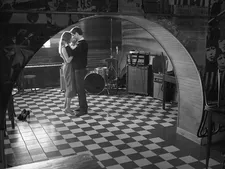 |
| Agata Trzebuchowska as Ida Dawid Ogrodnik as Lis: "These sort of provincial hotels and restaurants and bands that are playing Italian hits." |
PP: Sulamith. I wasn't thinking about that but it's a great poem.
AKT: Your film triggered this because there is a lot in the air.
PP: Certain films they have a certain kind of ambiguous music about them. You read them more as poetry. They suggest much more and I spent a lot of time weeding out all the time what felt like information. In most films, half the dialogue is just setting up the plot of the movie. And when you don't do that then dialogue triggers off associations, which is good.
AKT: When you went back to Poland to find the places that connected to what you called nostalgia, was it difficult? Cobblestone streets, the houses?
PP: No, I just had to look for them. You can find them but it's not kind of obvious. Poland is quite colorful these days, in a kind of vulgar way. It's like early wild capitalism with pistachio coloured houses and a lot of adverts everywhere. But quite sweet and kind of naive.
AKT: I had forgotten that they meet the saxophone player as a hitchhiker. He seems to always already have been there.
PP: Not much happens. So everything feels kind of necessary.
AKT: You wrote the screenplay?
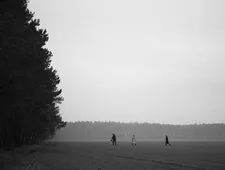 |
| A grave in the skies: "It wasn't the kind of film that settles scores, debunks myths." |
PP: I had a co-writer, an English dramatist [Rebecca Lenkiewicz], with a Polish surname but she has no connection to Poland, it's her stepfather's name. I've been working on this on and off for eight years. At some point I had worked with her but then when I was preparing the film and shooting it, I changed like 50% in the process. The writing with me is a particulate thing. It's not that I write the script and then shoot it. I write all the time and I refine it and distill it.
AKT: While shooting?
PP: While shooting too. I usually try and have a little break two thirds in to rewrite a little bit and have proper weekends so I can touch things up. For me there is no separation between writing and directing, it's the same process. The script was like an ongoing thing. Somebody asked my Polish producer this year for the script to deposit in the Academy core collection of scripts and she didn't know which script to send. Because there were 27 versions. That's what I do and then I have sleepless nights.
AKT: The two actresses are great together. Good chemistry.
PP: Yeah, one of them has never acted in her life and the other one is a really wonderful, experienced actress. A funny combination.
AKT: It fits with the roles.
PP: Yeah, yeah, it reflects the situation on screen.
AKT: To talk about the Holocaust in 2014….
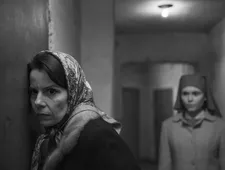 |
| Wanda's world: "Well, she was kind of loose, relatively speaking." |
PP: The film doesn't talk about the Holocaust as such. It's an important element but it wasn't what the film was about. Stalinism, too. I wanted the film to be timeless for people to recognize their own situation. Columbians or South Koreans or whatever. I didn't want the film to be an explanation of history. I don't think films are good at explaining. Films should feel like fairytales in a way and kind of hover above the ground a bit. And be universal.
The clash of vitality and tragedy is something that interested me. That we can be henchman and victim at the same time, paradoxical characters like Wanda. She is both. She has blood on her hands too. And the farmer, the peasant who killed the family, you kind of feel for him as well. I didn't want him to be some incomprehensible evil guy but a tragic figure in some way. It wasn't the kind of film that settles scores, debunks myths. It wasn't a political film in that way.
AKT: You bring up fairytales. I've quite a collection of people who spoke with me about their favourite tales, from the Dardenne brothers to Yoko Ono at Cooper Union. Is there a tale you particularly liked when you were little?
PP: Probably not. I loved Winnie the Pooh when I was little - which is not a fairytale. For me that was like the deepest book ever. And I was convinced it was a Polish book, because it was a brilliant translation which I knew by heart, practically. It was a shock to discover that it was an English writer who wrote it. I always kind of liked the sense of the absurd and fairytales didn't give me enough of that, I suppose.
Since our conversation, the Polish town of Tuszyn opposed to name a playground after Winnie the Pooh on the grounds of the bear's ambiguous gender and immodest clothing.
Ida is Poland's Oscar submission for Best Foreign Language Film at next year's Academy Awards.





















